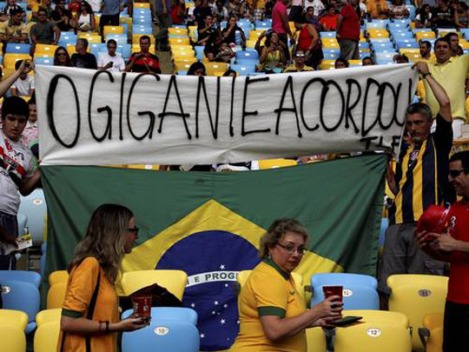
The almost certainty of violent demonstrations during the World Cup is not the only worry of the Rousseff administration. Neither the influx of European hooligans and neo-Nazis or Argentine barrabravas. A confidential report of the Secretary-General of the Cabinet of the President pinpoints problems in the 12 host cities ranging from environmental impacts till damages caused by construction works and areas demolishing houses, expelling residents and ousting businesses.

Pardon me, but the democracy needs a parking lot for the World Cup
The model of demolishing houses, expelling residents and shops for the construction works was done, according to the report, with no or low compensation. The text even speaks about “cleaning” around stadiums, which, in cities like Fortaleza, has led to the creation of slum cities. The document, called “Diagnóstico Preliminar da Copa” (Preliminary Diagnosis of the World Cup), was compiled from regional reports. Rio de Janeiro, São Paulo, Brasilia, Porto Alegre, Belo Horizonte and Fortaleza are the state capitals “most critical” in terms of safety.
In Rio, there is a “strained relationship between the public authority and society”. In São Paulo, the budget cut of BRL 60 million (USD 26 million) for the Policia Militar creates a “potential problem”. (Note: Simply said, the Policia Militar is the ordinary police in the street). In Porto Alegre, the state capital of Rio Grande do Sul, a strike of public transport employees can incite the category in the whole country. In Belo Horizonte, the state capital of Minas Gerais, strikes of civil servants can “trigger manifestations”. In Fortaleza there is a split in the Policia Militar. In Brasilia, “opposition parties try to discredit the image” of Governor Agnelo Queiroz of the PT (Partido dos Trabalhadores), the ruling labour party.
Several embassies, says the text of the report, already expressed concerns about the security of delegations and visitors. It isn’t yet clear whether the federal military forces will get active in the area of safety. Several times in recent days president Dilma Rousseff has been positive about the involvement of the federal armed forces in the security of the World Cup delegations. It is said, that in total some 150 thousand security personal, including armed forces, will be engaged. But there is serious concern about “de-standardising procedures and a lack of civil/institutional command of the Policia Militar”.

Protests in Buerarema/Bahia in a conflict between Native Indians and local farmers
In the state of Bahia, in Buerarema, where the delegations of Germany and Switzerland will be housed, are conflicts between the Native Indians and local farmers. In Mata de São João, where the Croats will be staying, quilombolas (the descendants of Afro-Brazilian slaves who escaped from slave plantations) claim 30,000 hectares of land.

In Mata de São João, where the Croats will be staying, quilombolas (the descendants of Afro-Brazilian slaves who escaped from slave plantations) claim 30,000 hectares of land
In Rio de Janeiro, the expropriation of land, houses and buildings without any compensation gives food to concerns, as well as the prohibition of free passage in certain stretches that caused “losses to commercial activity”. Another concern in Rio is the BRT Transcarioca (Bus Rapid Transport), which may not be ready for the World Cup.

In Cuiaba, the state capital of Mato Grosso, ten thousand old trees were victim to the construction works
In Cuiaba, the state capital of Mato Grosso, ten thousand old trees were victim to the construction works. In Recife, the state capital of Pernambuco, a hundred thousand activists camping in front of the government buildings can be mobilized for demonstrations (something similar as the Occupy Wallstreet action).

“Campus Party City” in the Convention Centre of Olinda/Recife, where protesters camp
In Natal, the state capital of Rio Grande do Norte, the broadening of the Avenida Roberto Freire has cost BRL 260 million (USD 112 million), but it’s only done for 4.5 km. In Manaus, the state capital of Amazonas, street vendors were removed without reallocation.

In Natal, the state capital of Rio Grande do Norte, the broadening of the Avenida Roberto Freire has cost BRL 260 million (USD 112 million), but it’s only done for 4.5 km
The report also talks of “sexual exploitation of children and adolescents and human trafficking”.
But there is more to be expected. Brazil expects to welcome some 600,000 foreign visitors during the month of the World Cup. With the football teams, the official delegates and the football fans, also the hard-core football fans, hooligans, skinheads and neo-Nazis will enter the country, with the pet criminals in their wake.
To try to neutralise actions against the World Cup, the Secretary-General studies options to publish a booklet about the legacies. That’s not so simple, as this week the legacy for South Africa after the World Cup was published and that didn’t show a positive picture. There is little to be expected for Brazil. At the time the final match is played and the world champion is known, some 60 billion reais (25 billion USD) have gone with the wind.
source: O Globo
